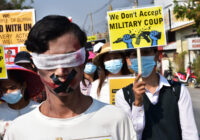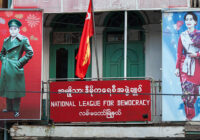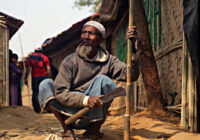The specter of Aung San Suu Kyi, the Nobel Peace laureate, standing before the UN’s highest legal body to defend Myanmar against charges of genocide is striking. Suu Kyi was once the revered face of international human rights, but she is now defending the most indefensible of crimes. But beyond the bizarre irony of her defense, the case may have real consequences. The attention it garners will increase pressure on Myanmar to change discriminatory policies and prevent further atrocities.
Suu Kyi’s appearance before the International Court of Justice (ICJ) in The Hague this week echoed strange defenses she made when more than 700,000 Rohingya Muslims fled from Myanmar in late 2017. Even as the fires of destroyed Rohingya villages continued to rage, with the smoke clearly visible just across the border in Bangladesh, she argued that no one was concentrating on the villages that hadn’t been destroyed. She has now further downplayed the widespread and coordinated nature of the attacks against Rohingya civilians, who she refused to refer to by name. She also claimed that a handful of domestic convictions of military officers — some already overturned — showed Myanmar was taking care of justice sufficiently itself.
Our Findings
Refugees International was on the ground in Bangladesh in the first days of the Rohingya crisis, speaking with refugees streaming into the country. As we testified before the US Congress in September 2017, there was a striking consistency in what we heard: “[S]oldiers surrounding villages, using various incendiary devices to set fire to homes, at times locking or throwing people inside the burning structures; young women singled out to be taken away and raped; dayslong flight by foot and/or boat across the border to Bangladesh, arriving with just the clothes on their backs.”
Our initial findings have since been backed up by the UN’s Independent Fact-Finding Mission, the US State Department and several other independent groups. The evidence is overwhelming. The crimes committed are indefensible. Suu Kyi’s comments can only be described as disingenuous or delusional.
But beyond the media storm unleashed by Suu Kyi’s appearance in The Hague on December 11, the case before the ICJ could have real consequences for the Rohingya in exile and those still living in Myanmar. The charges include not only that Myanmar committed genocide, but also that the Rohingya remain at risk of genocide inside Myanmar. The case calls for “provisional measures” — effectively restraining orders — for Myanmar to halt further abuses.
Such measures could help curtail ongoing abuses in the country and thereby create the conditions for Rohingya refugees to return home. As Refugees International documented earlier this year, Myanmar authorities continue to arbitrarily arrest Rohingya, use them for forced labor and target them for sexual assault. Myanmar also continues to limit Rohingyas’ freedom of movement, maintain displacement camps that are effectively open-air prisons, and force Rohingya to accept national verification cards that Rohingya believe will strip away any chance of citizenship.
UN Security Council on Myanmar
In reality, the ICJ cannot enforce these “provisional measures.” However, an ICJ ruling can encourage the UN Security Council and individual states to engage Myanmar on the issue of the Rohingya’s safe return home. The case is led by the Gambia and supported by the 57-country Organization of Islamic Cooperation.
The support of such a large swath of countries at the highest UN court has made it impossible for Myanmar to ignore. The fact that an official as high-level as Suu Kyi came to The Hague herself is unprecedented and only underscores the significance of the case.
This attention will also make it harder for China — a key supporter of Myanmar — to dismiss such abuses and continue to block stronger statements and further actions by the Security Council. Condemnation at the UN Security Council level could not only bring further targeted sanctions on top military officials and military-owned enterprises in Myanmar, but it would also make businesses wary of investing in this relatively new market. Short of Security Council action, the global scrutiny could also galvanize individual countries to impose their own sanctions. In concrete terms, this heightened disrepute worldwide could damage Myanmar’s economic attractiveness.
Even as Suu Kyi flies back to Myanmar, the ICJ case has focused the world’s attention on the Rohingyas’ plight. This ICJ probe has the potential to ratchet up international pressure on Myanmar and to prevent atrocities as the risk of genocide persists.
Rohingya refugees know a final judgment will take years. However, those with whom I have recently spoken are encouraged that Myanmar’s authorities may finally have to answer for their crimes. For these reasons alone, the ICJ case is welcome and deserves our attention.
The views expressed in this article are the author’s own and do not necessarily reflect Fair Observer’s editorial policy.
Support Fair Observer
We rely on your support for our independence, diversity and quality.
For more than 10 years, Fair Observer has been free, fair and independent. No billionaire owns us, no advertisers control us. We are a reader-supported nonprofit. Unlike many other publications, we keep our content free for readers regardless of where they live or whether they can afford to pay. We have no paywalls and no ads.
In the post-truth era of fake news, echo chambers and filter bubbles, we publish a plurality of perspectives from around the world. Anyone can publish with us, but everyone goes through a rigorous editorial process. So, you get fact-checked, well-reasoned content instead of noise.
We publish 2,500+ voices from 90+ countries. We also conduct education and training programs
on subjects ranging from digital media and journalism to writing and critical thinking. This
doesn’t come cheap. Servers, editors, trainers and web developers cost
money.
Please consider supporting us on a regular basis as a recurring donor or a
sustaining member.
Will you support FO’s journalism?
We rely on your support for our independence, diversity and quality.






